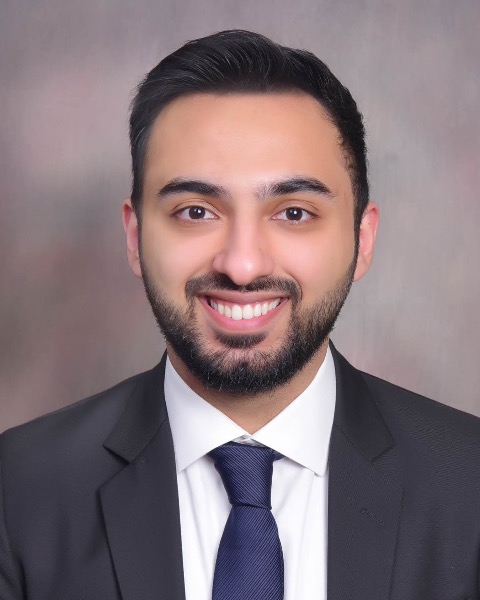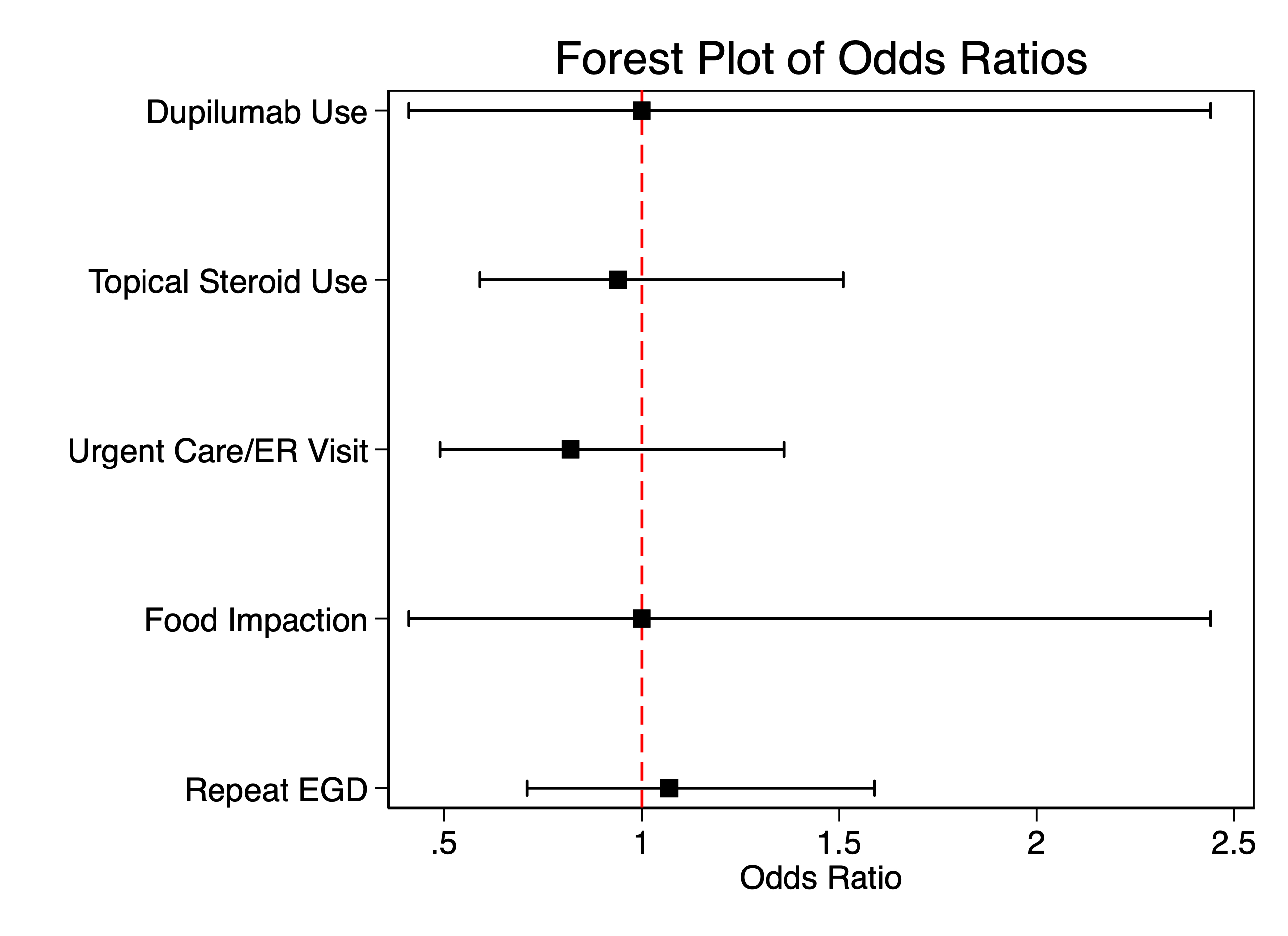Sunday Poster Session
Category: Diet, Nutrition, and Obesity
P0553 - Questioning the Efficacy of Dietary Interventions in Eosinophilic Esophagitis: Insights From a Multi-Institutional Real-World Clinical Data Network
Sunday, October 26, 2025
3:30 PM - 7:00 PM PDT
Location: Exhibit Hall

Imran Qureshi, MD (he/him/his)
Rutgers New Jersey Medical School
Newark, NJ
Presenting Author(s)
Imran Qureshi, MD1, Muhammad Ali Ibrahim Kazi, MD2, Sanmeet Singh, MD3
1Rutgers New Jersey Medical School, Newark, NJ; 2Anne Arundel Medical Center, Annapolis, MD; 3Luminis Health Anne Arundel Medical Center, Annapolis, MD
Introduction: Although Eosinophilic Esophagitis (EoE) is a relatively rare disorder, its incidence has risen sharply over the past decade. Believed to be an allergic condition, dietary interventions are considered a cornerstone of management, with studies demonstrating histological remission in adherents. However, these lifestyle modifications can be challenging, costly, and impractical for most. Thus, we aim to conduct this study to assess if there are significant differences in outcomes for patients who received dietary counseling.
Methods: We conducted a retrospective cohort study utilizing the TriNetX database to identify patients ≥18 years old with EoE confirmed with endoscopic evaluation who had not received dietary or nutritional counseling in the past year. We divided these patients into two cohorts: EoE with and without dietary counseling. We then conducted 1:1 propensity score matching, balancing demographic variables. Outcomes were assessed 3 months to 1 year after diagnosis of EoE and included repeat EGD, food impaction, urgent care/ER visits, need for topical steroids, and Dupilumab initiation. We analyzed the measures of association in the form of odds ratio (OR), reporting a 95% confidence interval (CI) and P-value.
Results: 33,145 patients ≥18 years of age with EoE were identified. Of these, 32,841 did not get formal dietary counseling, and 304 did. After propensity score matching, there were 304 patients in each cohort. Compared to patients with EoE without dietary counseling, patients with dietary counseling had no significant difference in the need for repeat EGD [OR 1.07= (95% CI 0.71-1.59, p-value=0.76)], food impaction [OR=1.00 (95% CI 0.41-2.44, p-value=1.00)], urgent care/ER visits [OR=0.82 (95% CI 0.49-1.36, p-value=0.44)], topical steroid use [OR=0.94 (95% CI 0.59-1.51, p-value=0.81)], and Dupilumab initiation [OR=1.00 (95% CI 0.41-2.44, p-value=1.00)] (Figrue 1).
Discussion: Our findings from real-world data demonstrate that despite dietary counseling, there was no significant difference in complications due to EoE in our cohort. This underscores the need to rethink our approach to managing EoE with more feasible and efficacious interventions to prevent complications.

Figure: Figure 1: Forest plot of odds ratios and their 95% confidence intervals of outcomes in patients with Eosinophilic Esophagitis who received formal dietary counseling.
Disclosures:
Imran Qureshi indicated no relevant financial relationships.
Muhammad Ali Ibrahim Kazi indicated no relevant financial relationships.
Sanmeet Singh indicated no relevant financial relationships.
Imran Qureshi, MD1, Muhammad Ali Ibrahim Kazi, MD2, Sanmeet Singh, MD3. P0553 - Questioning the Efficacy of Dietary Interventions in Eosinophilic Esophagitis: Insights From a Multi-Institutional Real-World Clinical Data Network, ACG 2025 Annual Scientific Meeting Abstracts. Phoenix, AZ: American College of Gastroenterology.
1Rutgers New Jersey Medical School, Newark, NJ; 2Anne Arundel Medical Center, Annapolis, MD; 3Luminis Health Anne Arundel Medical Center, Annapolis, MD
Introduction: Although Eosinophilic Esophagitis (EoE) is a relatively rare disorder, its incidence has risen sharply over the past decade. Believed to be an allergic condition, dietary interventions are considered a cornerstone of management, with studies demonstrating histological remission in adherents. However, these lifestyle modifications can be challenging, costly, and impractical for most. Thus, we aim to conduct this study to assess if there are significant differences in outcomes for patients who received dietary counseling.
Methods: We conducted a retrospective cohort study utilizing the TriNetX database to identify patients ≥18 years old with EoE confirmed with endoscopic evaluation who had not received dietary or nutritional counseling in the past year. We divided these patients into two cohorts: EoE with and without dietary counseling. We then conducted 1:1 propensity score matching, balancing demographic variables. Outcomes were assessed 3 months to 1 year after diagnosis of EoE and included repeat EGD, food impaction, urgent care/ER visits, need for topical steroids, and Dupilumab initiation. We analyzed the measures of association in the form of odds ratio (OR), reporting a 95% confidence interval (CI) and P-value.
Results: 33,145 patients ≥18 years of age with EoE were identified. Of these, 32,841 did not get formal dietary counseling, and 304 did. After propensity score matching, there were 304 patients in each cohort. Compared to patients with EoE without dietary counseling, patients with dietary counseling had no significant difference in the need for repeat EGD [OR 1.07= (95% CI 0.71-1.59, p-value=0.76)], food impaction [OR=1.00 (95% CI 0.41-2.44, p-value=1.00)], urgent care/ER visits [OR=0.82 (95% CI 0.49-1.36, p-value=0.44)], topical steroid use [OR=0.94 (95% CI 0.59-1.51, p-value=0.81)], and Dupilumab initiation [OR=1.00 (95% CI 0.41-2.44, p-value=1.00)] (Figrue 1).
Discussion: Our findings from real-world data demonstrate that despite dietary counseling, there was no significant difference in complications due to EoE in our cohort. This underscores the need to rethink our approach to managing EoE with more feasible and efficacious interventions to prevent complications.

Figure: Figure 1: Forest plot of odds ratios and their 95% confidence intervals of outcomes in patients with Eosinophilic Esophagitis who received formal dietary counseling.
Disclosures:
Imran Qureshi indicated no relevant financial relationships.
Muhammad Ali Ibrahim Kazi indicated no relevant financial relationships.
Sanmeet Singh indicated no relevant financial relationships.
Imran Qureshi, MD1, Muhammad Ali Ibrahim Kazi, MD2, Sanmeet Singh, MD3. P0553 - Questioning the Efficacy of Dietary Interventions in Eosinophilic Esophagitis: Insights From a Multi-Institutional Real-World Clinical Data Network, ACG 2025 Annual Scientific Meeting Abstracts. Phoenix, AZ: American College of Gastroenterology.
